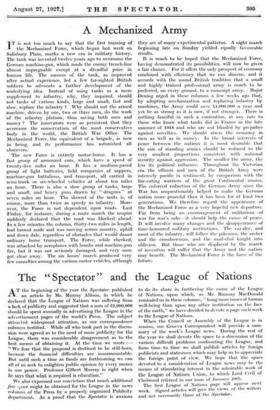A Mechanized Army TT is not too much to say
that the first training of -1- the Mechanized Force, which began last week on Salisbury Plain, marks a new era in military history. The tank was invented twelve years ago to overcome the German machine-gun, which made the enemy trench-line almost impregnable except at a dreadful price in human .life. The success of the tank, as improved after _ actual experience, led a few far-sighted British soldiers to advocate a further development of the underlying idea. Instead of using tanks as a mere supplement to infantry, why, they inquired, should not tanks of various kinds, large and small, fast and slow, replace the infantry ? Why should not the armed machine, driven by one, two or three men, do the work of the infantry platoon, thus saving both men and money ? The innovators were _so persistent that they overcame the conservatism of the most conservative body in the world, the British War. Office. The Mechanized Force, the equivalent of a brigade, is now in being, and its performance has astonished all observers.
The new Force is entirely motor-borne. It has a fast group of armoured cars, which have a speed of twenty-five miles an hour. It has a medium-paced group of light batteries, field companies of sappers, machine-gun battalions, and transport, all carried in semi-track or six-wheeled vehicles at about ten miles ari hour. There is also a slow group of tanks, large and small, and heavy guns drawn by " dragons " at seven miles an hour. The slowest of the units is, of course, more than twice as speedy as infantry. More- oYei, the Force is not' dependent upon roads. Last kriday; for instance, during a route march the umpire sriddenly declared that the road was blocked ahead. In a few minutes the column, thirty-two miles in length, had turned aside and was moving across country, uphill and down dale, regardless of obstacles that would daunt ordinary horse transport. The Force, while checked, was attacked by aeroplanes with bombs and machine-gun fife, but it was not seriously damaged, and very soon got clear away. The six hours' march produced very few casualties among the various motor vehicles, although they are of many experimental patterns. A night march beginning late on Sunday yielded equally favourable results.
It is much to be hoped that the Mechanized Force, having demonstrated its possibilities, will now be given a fair chance: For it offers the only prospect of economy combined with efficiency that we can discern, and it accords with the sound British tradition that a small and highly trained professional army is much to be preferred, on every ground, to a conscript army. Major Dening urged in these columns a few weeks ago that, by adopting mechanization and replacing infantry by machines, the Army could save £4,000,000 a year and yet be as strong as it is now, if not stronger. There is nothing fanciful in such a contention, at any rate to those who know what tanks did in France in the late summer of 1918 and who are not blinded by prejudice against novelties. We should stress the economy in men as well as in money. In the broad interests of peace between the nations it is most desirable that the size of standing armies should be reduced to the very smallest proportions consistent with national security against aggression. The smaller the army, the less its political influence. Throughout the :Victorian era the officers and men of the British Army were intensely pacific in sentiment, by comparison with the fire-eating warriors of the great Continental armies. The enforced reduction of the German Army_ since the War has unquestionably helped to make the German nation more peaceful than it has been for at least two generations. We therefore regard the appearance of the Mechanized Force as a very hopeful new departure. Far from being an encouragement of militarism—of war for war's sake—it should help the cause of peace. It will involve many changes and the disappearance of time-honoured military institutions. The cavalry, and most of the infantry, will follow the pikeman, the archer and the crossbowman, and the mail-clad knight into oblivion. But those who are displaced by the march of invention will suffer that the Army and the nation may benefit. The Mechanized Force is the force of the future.


































 Previous page
Previous page